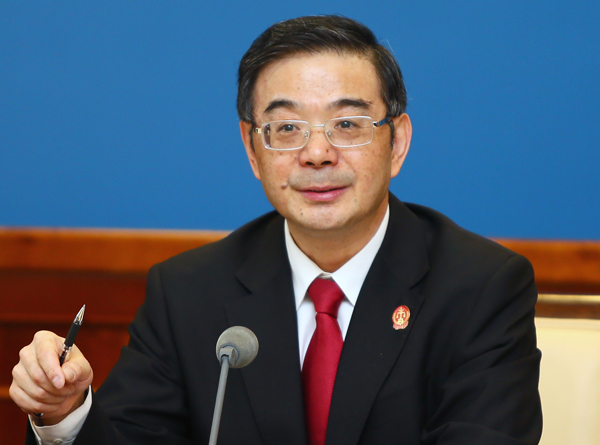 |
|
Zhou Qiang, president of the Supreme People's Court, asks courts to better handle disputes involving foreigners. Sun Ruofeng / for China Daily |
China's top judge has asked the courts to improve the legal environment through better handling of disputes involving foreigners, particularly in the marine sector, as the country opens wider to the outside world and tries hard to attract overseas enterprises.
Zhou Qiang, president of the Supreme People's Court, said it is important for such cases to be heard in China, as the number has been growing over the past few years, an indication of China's growing integration into the world economy.
Among the cases involving foreigners, many are related to disputes on the sea, Zhou said.
Last year alone, 10 Chinese marine courts, including the Qingdao Maritime Court in Shandong province, concluded 1,030 cases involving foreign litigants — a 6.85 percent increase year-on-year, according to official statistics.
"Better handling of these marine cases involving foreigners will help build China's judicial image in the world and will attract more litigants from overseas to select our courts to settle marine disputes," Zhou said.
The large number of marine cases involving foreigners has motivated the courts to be more professional in the hearings so they can better protect national maritime security, he said.
Last year in China, 15,348 civil and commercial cases involving foreigners were recorded, basically the same as recorded in 2014, according to the top court.
"How well we can handle these commercial disputes involving foreigners will, to some extent, affect the country's Belt and Road Initiative and its efforts to operate a slew of free trade zones," he said.
The initiative, proposed by President Xi Jinping in 2013, covers the Silk Road Economic Belt and the 21st Century Maritime Silk Road. It aims to improve connectivity and boost trade with countries along the ancient trade routes spanning Asia, Europe and Africa.
Solving such commercial litigation means foreign businesspeople can receive good legal services in China, so this will help build an open, safe and efficient economic system in the country, Zhou said.
The top judge asked all courts to treat litigants, Chinese and foreign, on an equal footing, adding that sound protection of legal rights and strict law enforcement will contribute to China's economic prosperity.
He also asked Chinese courts to be more active in participating in international rule-making, saying this will give the country a stronger voice in world legal affairs.
Meanwhile, Chinese courts concluded 649 criminal cases involving foreigners last year, down 7.15 percent from 2014, according to official statistics.
But there are still some thorny issues, such as a lack of judges who can speak English well and who have a good knowledge of foreign laws, Zhou said.